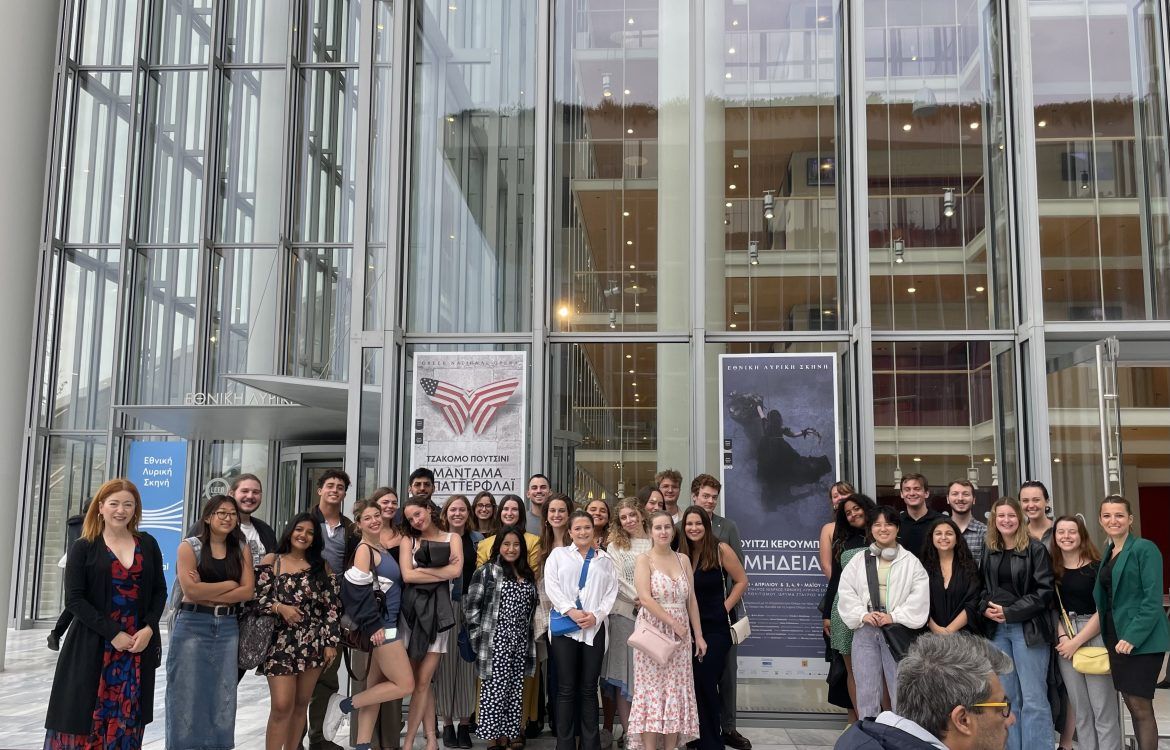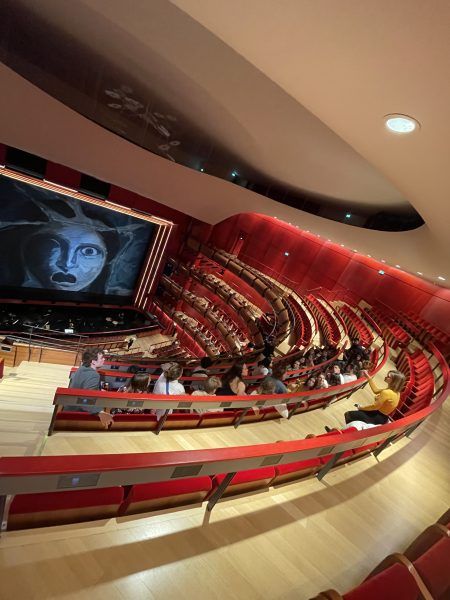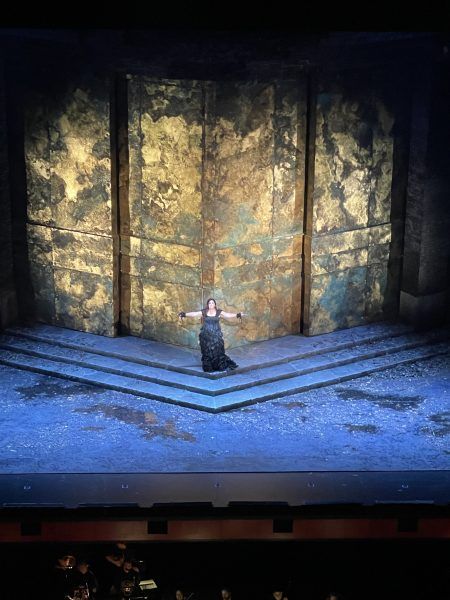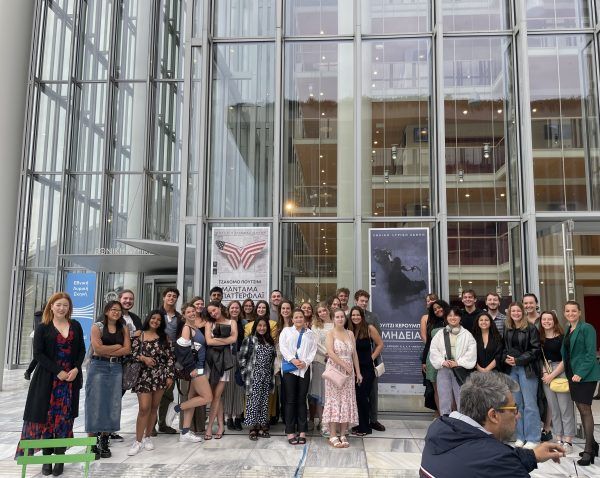
Concluding the Myth and Religion Course with a Night at the Opera
Article by CYA Spring ’23 student, Willa Broderick.
Upon entering the grand halls of the Greek National Opera at the Stavros Niarchos Foundation, a familiar sense of excitement enveloped me. As I walked with my peers to our assigned seats, my senses were first greeted by the harmonious music emanating from the pre-show orchestral rehearsal. Casting my gaze upon the audience below, I observed a sea of elegantly attired individuals, their graceful appearance adding to the allure of the scene. The touch of my skin against the red velvet upholstery of the seat beneath me completed the sensory symphony. These sensations hold a cherished place in my heart.
As a dancer who has spent years immersed in the world of theater, I was thrilled at the opportunity to embark on a field trip to watch Cherubini’s opera Medea as part of my Myth and Religion course taught by CYA professor Nina Papathanasopoulou. This experience provided a unique lens through which to explore Greek performance art, deepening my understanding of and appreciation for Greek culture. Moreover, I was impressed with the opera’s ability to convey the profound emotional depth of Medea, exemplifying how art serves as a powerful tool for understanding and interpreting the complex narratives of Greek mythology.
Our class was fortunate that Nina Papathanasopoulou had arranged a discussion for us with the GNO Director of Stage, Ms. Katerina Petsatodi, before the opera began. Knowledgeable and articulate, Ms. Petsatodi explained to our class how every aspect of the theater experience has been meticulously crafted. The tolling of bells signaling the end of intermission and the stagehands donned in their tailored black garments all contribute to an extremely structured environment. Rather than stifling the vitality of the performances, however, these structures serve as a framework that amplifies their liveliness. By removing the distractions of the outside world, the theater creates a space where audiences can fully immerse themselves in the narrative being performed. It was through talking to Ms. Petsatodi that I truly understood the level of coordination between music, song, stagecraft, and backstage effort required to bring the story of Medea to life.

Speaking with the GNO stage director, Katerina Petsatodi, before the opera.
The opera Medea provided me with a captivating glimpse into the performance art of Greek culture. While I had been exposed to various other facets of Greek culture through my time at CYA, witnessing performance art in this context was truly special—it served as a reminder of the universality of artistic expression and its ability to transcend cultural boundaries. The opera showcased the rich tapestry of Greek mythology and brought it to life in a contemporary setting. The fusion of ancient Greek drama, characterized by its use of the chorus, spoken word, and homage to the gods, with the operatic medium, created a mesmerizing experience that bridged the gap between ancient and modern times. This performance demonstrated the enduring relevance and emotional resonance of Medea, a myth that explores themes including alienation, jealousy, love, and violence.
It was further fascinating to observe the opera as a form of dance and movement in itself. The choreography of the performers, although more subtle than the movements I am accustomed to, conveyed emotion and narrative through gesture and expression. It is because of the ubiquitous language of dance that spans cultural and temporal contexts, and its ability to communicate profound ideas, that movement is an ideal medium to explore complex myths such as Medea. Furthermore, the expressive power of the music and the vocal performances in Medea allowed for a portrayal of ranging emotions, from the anguish of betrayed love to the depths of despair and revenge. The heightened emotions and larger-than-life characters found in Greek mythology found a natural home in the opera, which accentuated their dramatic impact. Art, in its various forms, offers a unique lens through which to receive and interpret mythological narratives—the opera Medea successfully harnessed the transformative power of performance art to immerse the audience in the emotional core of the story.
Moreover, the educational excursion to the opera was built upon our in-class discussions on Medea. Prior to attending the opera, Nina Papathanasopoulou had engaged our class in an in-depth study of the myth, delving into the complexities of Medea’s character and contemplating whether we could empathize with her predicament. It was largely agreed upon that Medea evoked sympathy due to her profound sense of estrangement and seclusion. The opera astutely built upon these discussions by employing various artistic devices. Throughout the performance, Medea was deliberately portrayed as a solitary figure, distanced from the other characters, metaphorically underscoring her isolation. Additionally, the emotive power of her vocal performance further intensified the portrayal of her emotional turmoil. In this manner, the operatic adaptation of Medea skillfully complemented and expanded upon the analytical discourse that we had in the classroom.

Anna Pirozzi as Medea in the Greek National Opera’s production of Cherubini’s Medea.
Through the exploration of the opera Medea, I not only deepened my understanding of Greek performance art but was also reminded of the universal power of artistic expression. The graceful movements and harmonious fusion of music and voice breathed life into Medea’s complicated tale of love, betrayal, and seclusion. This operatic symphony, skillfully blending ancient Greek drama with contemporary sensibilities, underscored the lasting impact of art on our understanding and interpretation of mythological narratives. As the curtains fall on my visit to the Greek National Opera, and as my time at CYA comes to a close, I carry with me the timeless resonance of Greek myth—forever woven into the fabric of my own personal odyssey.

The Myth and Religion students at the Greek National Opera’s Medea at the Stavros Niarchos Foundation on May 9, 2023. Accompanied by CYA Nina Papathanasopoulou, and CYA Sociology Professor, Rosa Vasilaki.






